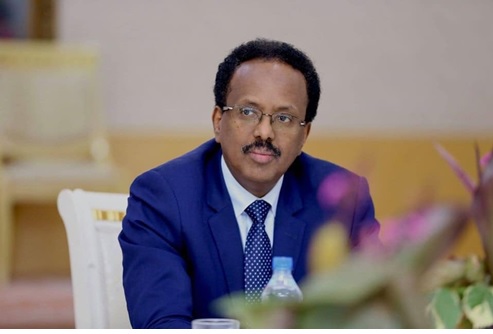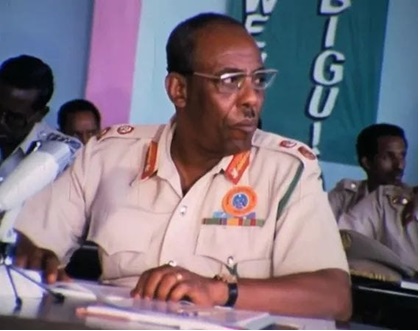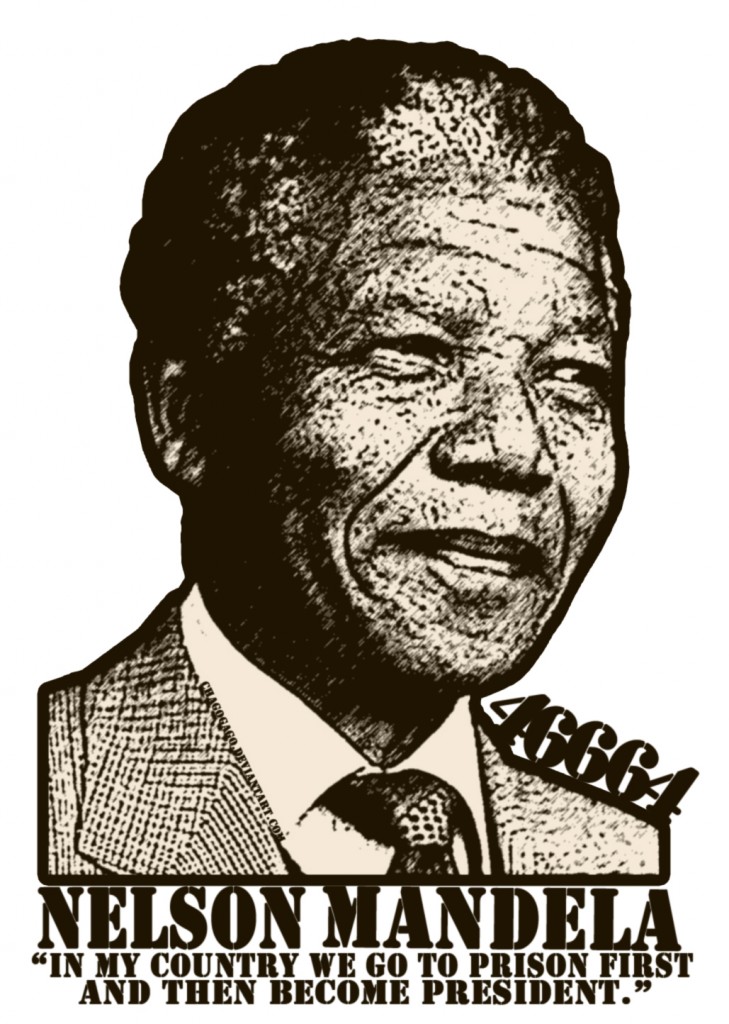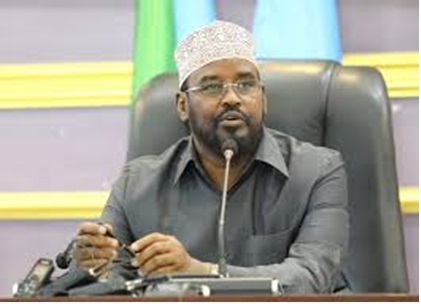By Aqbal Aabi
Oday Abdulle, the well-known Somali standup comedian recently captured the attention of Somalis via social media when he and his band produced a short skit depicting Farmajo’s erratic and narcissistic behavior. The short film starts with a group of nine people in a conference room ready for a seminar with one seat empty—apparently left for the instructor to occupy. Oday Abdulle is welcomed to the conference room where he was expected to lead a seminar for the attendees. Shortly after Oday Abdulle is situated in his seat, he started the seminar by asking if anyone had a question. One of the attendees innocently asked a question about the plans of the seminar for that day. Oday Abdulle stood up from his seat immediately and demanded the person who asked the question to leave the room. He told the attendees that this would be the fate of anyone who dared to ask any questions.

The short play continues as Oday Abdulle orders each one of the attendees to leave the room, one after the other, until Oday Abdulle finds himself alone in the room. Surprisingly, Oday Abdulle then realizes that no one is left in the room and starts to speak to the empty conference asking himself: What happened to all the people?
After a short while, Oday Abddulle forces himself out of the room in a manner similar to how he ousted all the attendees. This short play conveys the generally held view by most Somalis about the current regime. It also accurately portrays the tyrannical personality of Mr. Farmajo; the man inhabiting currently in Villa Somalia.
The nostalgic memories of peaceful and prosperous Somalia are in the psyche of every Somali old enough to have lived in the heydays of the country’s pre-civil war era. In those golden days and the short experience of statehood, Somalia built Africa’s strongest military, once known as the ‘Lions of Africa.” Almost all Somali adults carry reminiscence with near reverence for the mighty Somali military. This admiration is solely reserved for the country’s early peaceful days where pastoralists were awed by the newly-founded urbanized lifestyle despite the country’s experience with constant social and economic struggles.
However, a closer look at Siyad Barre’s political, military, patronage networks in the state collapse, and the subsequent civil war paint a different picture that requires further examination without prejudice. In 1969, Siyad Barre used the military to take power through coup de’ tat, hijacked the democratic process still in its infancy, and derailed the prospect of a stable nation. Somalia was one of the first African countries in the post-colonial era to establish solid democratic institutions. Prior to the military’s coup, Somalia held two successful elections that paved the way for the ascendance of the duly elected presidents of Aden Abdulle Osman and Abdirashid Ali Sharmarke.
When Siyad Barre took power, he swiftly disbanded the parliament, supreme court and abolished the constitution in a bid to consolidate power. From that point on, Somalia was on a path to self-destruction in which the country never fully recovered. Not long after the coup, in a selfish power move, Siyad Barre turned against his co-conspirators and sacked most of his closest colleagues from the leadership circles while executing others. Now fully in power, Siyad Barre’s natural next step became to set up the structure that kept him in power for two more decades. What was the structure that kept him in power for so long? It was none but the use of identity politics and weaponized lineage; The most destructive element of the Somali culture.

Siyad Barre created a military apparatus that was based on politicized clan affiliations to fend off potential and imminent threat to his power. The first of such a threat came from the two notorious early opposition movements in Northern and North Eastern Somalia respectively. Siyad Barre used collective punishment as the means to repress and silence those early opposition voices. The atrocities committed against entire communities in the Northwestern and, to lesser extent, Northeastern parts of Somalia served as the impetus for the social fragmentation of the Somali people. The once powerful and well-respected mighty military was later reduced to a coalition of clan-based militias that not only destroyed the promising state structures of the young nation, but distorted the image of nationhood in the psyche of the Somali people.
My objective in this short historical overview is not to correct the wrongs of Barre’s regime, but to bring to the reader’s attention of the impending replay of Barre’s most destructive tactics by Farmajo’s current regime. In my assessment, Farmajo is ailing from what is known as the “Mandela effect,” a phenomenon where people share false memory of past events that is different than what really happened. Based on Wikipedia account, the self-described “paranormal consultant” Fiona Broom reported a false memory of Mandela dying in prison in the 1980s while it’s known that Mandela got out of prison and became South Africa’s president. He later died in 2013. In Farmajo’s distorted thinking, Siyad Barre’s ill-fated manipulation of Somalia’s military to stay in power is a blueprint for his fantasized role as the de facto leader of Somalia.

Farmajo’s power moves and decision-making behavior mimics that of the late Siyad Barre. Presenting strong nationalistic and patriotic public facade while engaging political patronage empowering the ruthless cabal of foreign agents camouflaged under the official banner of the National Intelligence Security Agency (NISA).
Like Siyad Barre, Since the day he assumed the role of Somalia’s presidency on February 8th, 2017, Mr. Farmajo has been working towards consolidating power to achieve total control over the Somali territories that was not under the rule of Al-Shabaab. As part of this grandiose plan, Farmajo and his hand-picked stooges, who often do not carry formal roles within the proper government channels, started to dislodge the former speaker of the House, Mr. Mohamed Osman Jawari. They eventually bought their way to replace him with a sycophant named Mohamed Mursal. The goal of this first attempt to control the parliament was to remove all the constitutional power of the parliament and leave it with nominal ceremonial role.
The next target was the Federal Member States (FMS) that Farmajo deemed a threat to his autocratic rule of Somalia. The first prey of Farmajo’s power consolidation was Hirshabelle State of Somalia (HSS) where the federal government literally micromanages its affairs. Hirshabele depends on Mogadishu economically as well as for its security. Mr. Waare is a nominal leader of Hirshabelle and must conform to the dictates of Mr. Farmajo.
The deadly power grab of Southwest State of Somalia (SWSS) followed suit where this time Farmajo used foreign military power, namely the Ethiopian military, to subdue his political opponents. Scores of Somalis were killed mercilessly as they demanded fair and free election. The Southwest debacle was the first time that Mr. Farmajo, who came to power with the slogan of “Soomaaliya Soomali baa leh” (Somalia is for Somalis) showed his true power-driven personality to the Somali people. Most of the Somali people were deceived by Farmajo’s façade image that was filled with patriotism and nationalistic overtones, and that he was indeed against Ethiopia; the historical rival of Somalia. The poor Mukhtar Robow was then humiliated and put behind bar with the help of the Ethiopian military based in Baidao. Mr. Robow, a veteran warrior of Al-Shabab, had recently renounced his extremist views, and severed ties with the radical group which he helped found in the heydays of the Somali Islamist movements. As we write these notes, Mr. Robow is in the custody of the NISA. Farmajo manipulated the election outcome of the South West and Laftagareen was inaugurated to join his team of handmade Federal Member State puppets.

Now, it’s Jubbaland’s turn. But, there is a problem. Jubbaland leader is not like any other incumbent that Farmajo’s power consolidation plan faced. Mr. Ahmed Madobe is credited for bringing some semblance of security to the region and its semi-government structure. The region was one of the most hard-hit parts of Somalia by the civil war and changed many hands since the collapse of the central government. At the time of Raskambooni brigades’ capture of Kismayo, Al-Shabab extremists were ruling the region for over seven years. Therefore, Mr. Madobe enjoys wide support from the Jubbaland population, where the most diverse clan lineages in one geographic area in Somalia is found. Kenya also has close ties with the Jubbaland leadership and considers this part of Somalia a buffer zone to deflect Al-Shabab’s aggression into midland Kenya. The Independent Jubbaland Election Commission managed the election process with ultimate courage and professionalism. They rejected all Villa Somalia’s attempts to influence the outcome of the election, and they maintained their independence to the end. According to credible sources including members of the federal parliament, the president used divide and rule tactics by financing and sending several presidential candidates, including three men from Mr. Madobe’s Kumade clan to unseat him.
When this initial plan failed, Farmajo again resorted to using Ethiopian military muscle by sending a military plane full of special operation units, and tried to deploy in Kismayo’s Airstrip. The Jubbaland intelligence agency received an early warning about the pending coup in which the Kismayo based Ethiopian army units were readied to take over Kismayo while the role of the special operation units was to arrest Mr. Madobe and take him to Mogadishu towards a fate similar to that of Robow’s. The Jubbaland Darawish battalion had to use armoured vehicles and pickups mounted with artillery and had to literally block the airstrip runway. The Ethiopian military plane could not land and returned to its base in Harar, in Eastern Ethiopia. Jubbaland elections were concluded without disruption and Sayid Ahmed Mohamed Islam “Ahmed Madobe” was reelected as president for another four-years. Many observers believe that Mr. Madobe engineered the JSS elections in hopes to remain in his seat. Nevertheless. there was a transparent process that allowed a less known female presidential candidate to win a close second place. Mr. Farmajo and his associates boycotted the election results and refused to accept Mr. Madobe’s reelection.
Mr. Farmajo plan did not stop there: He continued to conspire against the Jubbaland leadership. His political operators mislead the international community and demanded them to boycott the election results. Furthermore, the discredited Interior Ministry, using the financial muscle of the federal government, imposed economic blockade on the millions of innocent people in Jubbaland. The federal government issued a decree prohibiting all direct flights to and from Kismayo. Furthermore, it immediately cut off all federal financial allocations for Jubbaland and funds from international donors. This had a huge economic impact on the livelihood of the average citizens living in Jubbaland.
The story of Galmudug is even more depressing. Farmajo and his associates poured federal dollars into the main cities, including Dhusomareeb and Cadaado to sell their grandiose agenda. Similar tactics were employed where paid local militias, Ethiopian military units and federal military units flown in from Mogadishu amassed in Dhusomareeb. As expected, the result was three rival administrations all vying to be the legitimate representative of the people of Galmudug State of Somalia. The details of the impact of Farmajo’s manipulation of Galmudug’s election process and its long-term effect on the member states’ political structure requires more attention than the current space allows.
Finally, Mr. Farmajo is currently using his last attempt to dislodge Mr. Madobe, the current Jubbaland administration, and replace him with another loyalist “Madaxa gareen”. This time Mr. Farmajo is ready for all-out war with Jubbaland leadership at any cost, including loss of innocent lives. Again, Mr. Farmajo is using Ethiopian military and misinformed federal military units. The plan is to bring all cities in Gedo region under the Ethiopian military control with paid local militias and few high-ranking military officers flown in from Mogadishu. Farmajo’s eyes are now on Buale; the Al-Shabab held capital of Jubbaland. With the anticipated successful capture of Buale, it’s believed that Farmajo is planning a parallel election to effectively install a second Jubbaland administration; a more loyal member state that will complete Farmajo’s 2020 reelection roadmap. This is a road to nowhere!
While Farmajo was busy with the systematic breakup of the federal institutions and Federal Member States, Al-Shabab extremists successfully infiltrated all federal agencies, doubled their tax collection revenue, including that from the main Mogadishu Port and upgraded their ability to attack the heart of Mogadishu at will. All this mayhem is happening due to Farmajo’s obsession with power and his desire to manipulate the upcoming elections of the Federal government of Somalia. My question is: Will the Somali people allow Farmajo to once more take Somalia to road of self-destruction?
Aqbal Aabi
Email: [email protected].
We welcome the submission of all articles for possible publication on WardheerNews.com. WardheerNews will only consider articles sent exclusively. Please email your article today . Opinions expressed in this article are those of the author and do not necessarily reflect the views of WardheerNews.
WardheerNew’s tolerance platform is engaging with diversity of opinion, political ideology and self-expression. Tolerance is a necessary ingredient for creativity and civility.Tolerance fuels tenacity and audacity.
WardheerNews waxay tixgelin gaara siinaysaa maqaaladaha sida gaarka ah loogu soo diro ee aan lagu daabicin goobo kale. Maqaalkani wuxuu ka turjumayaa aragtida Qoraaga loomana fasiran karo tan WardheerNews.
Copyright © 2024 WardheerNews, All rights reserved


